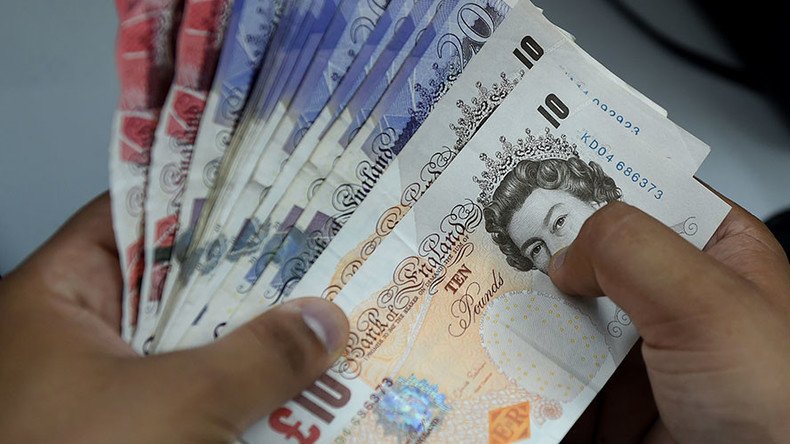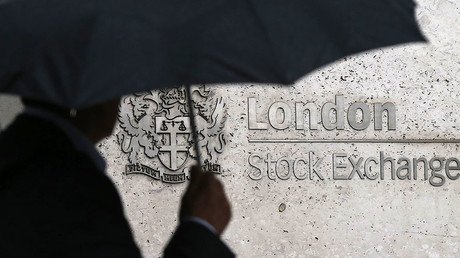Backtracking IMF admits UK is fastest growing G7 economy, despite post-Brexit recession warning

The International Monetary Fund (IMF) has backtracked on its gloomy post-Brexit forecast for Britain, now saying the UK will boast the fastest-growing major economy in 2016.
In its new report, the IMF predicts the UK’s gross domestic product (GDP) will grow by 1.8 percent this year ahead of the US, Germany, Japan and other members of the G7.
Prior to the June referendum, the IMF claimed a Brexit would plunge the UK into recession. It has now conceded that those warnings proved to be overly pessimistic.
However, it forecast a sharp slowdown in 2017, claiming the economy would eventually suffer from the shock of the EU referendum result. It said expansion next year would be just 1.1 percent, lower than expected in the immediate aftermath of the Brexit vote.
The IMF’s economic counsellor, Maurice Obstfeld, said the Brexit vote left the future of UK’s trade and financial relations with the other 27 EU member states unclear.
“Alongside economic anxiety and other factors, the Brexit vote reflects a resentment of cross-border migration that has fueled nationalist sentiment in Europe and called into question the way forward for EU integration,” he said.
The IMF also cautioned that economic data since the referendum had been limited and said the fall in sterling would prompt inflation to rise from 0.7 percent this year to 2.5 percent in 2017.
It also cut its medium-term growth forecast for the UK from 2.1 percent to 1.9 percent as a result of what it assumes will be barriers to trade, migration and capital flows.
The news comes after the pound hit a new 31-year-low against the US dollar on Tuesday, slumping to $1.276, falling below its post-referendum low as fears of a “hard Brexit” intensify.
Investors appear to be spooked by Prime Minister Theresa May’s announcement on Sunday that she will trigger Article 50 of the Lisbon Treaty, launching formal Brexit talks with EU leaders, before March 2017.
Her announcement has put the UK on course for a Brexit which would likely see Britain lose access to the single market as part of its plan to clamp down on immigration by 2019.
Pound Slides to 30-Year Low as Angst Over #Brexit Persists https://t.co/VXoigywUof via @business#BrexitMeansBrexit#poundsterling#fxpic.twitter.com/xe8zOxept4
— justin carrigan (@justincarri) October 4, 2016
However, Britain’s falling currency is actually helping the markets.
The FTSE 100 bounced to its highest value in more than a year on Tuesday, rising above 7,100 points for the first time since April 2015.
The share index’s value is supported in that the market is largely made up of export-dominated multinationals which make the bulk of their sales in dollars.
The depreciating pound has also been good for manufacturing. UK factories had their best month in more than two years in September as the weaker pound sent export orders surging.
IHS Markit’s monthly Purchasing Managers Index (PMI) jumped to 55.4 from 53.4 in August, capping the industry’s best quarter in 2016.
The reading, the highest since June 2014, is high above economists’ forecasts for 52.1, pushing the index even further above the 50 line that divides expansion from contraction.
Activity in the construction sector also expanded unexpectedly in September for the first time since May. The survey of purchasing managers in the construction industry rose from 49.2 in August to 52.3 in September.
The latest figure is substantially better than predicted, with forecasts of 49.0.
Also on the back of the weak sterling, tourists are reportedly flocking to the UK to buy up big-ticket goods.
According to the Daily Mail, Britain's retailers are expecting a “golden week” as record numbers of Chinese shoppers prepare to come to the UK to shop for luxury items. Westfield shopping centers have hired Chinese-speaking concierges to assist visitors.
Sterling has fallen by more than 12 percent against the Chinese yuan since the vote to leave the EU.














